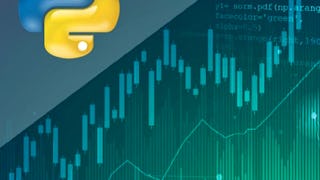Updated in May 2025.
This course now features Coursera Coach! A smarter way to learn with interactive, real-time conversations that help you test your knowledge, challenge assumptions, and deepen your understanding as you progress through the course. This course provides a solid foundation in using Python for financial analysis and investment decision-making. You'll learn to apply Python programming and data analysis tools to solve financial problems, from basic calculations to advanced portfolio optimization. The course starts with Python programming basics, including the installation of Jupyter and Anaconda, and progresses to key financial concepts such as calculating rates of return, measuring investment risk, and handling time-series data. As you advance, you’ll gain hands-on experience using Python libraries tailored for financial modeling and analysis. Topics like the Capital Asset Pricing Model (CAPM), Markowitz Portfolio Theory, and Monte Carlo simulations will help you optimize portfolios and evaluate risk. By the end, you’ll be equipped to analyze financial data, perform regression analysis, and apply Python to real-world investment challenges. This course is perfect for finance enthusiasts and those looking to merge finance with programming and data analysis. Basic finance knowledge is helpful, but no prior Python experience is required.















